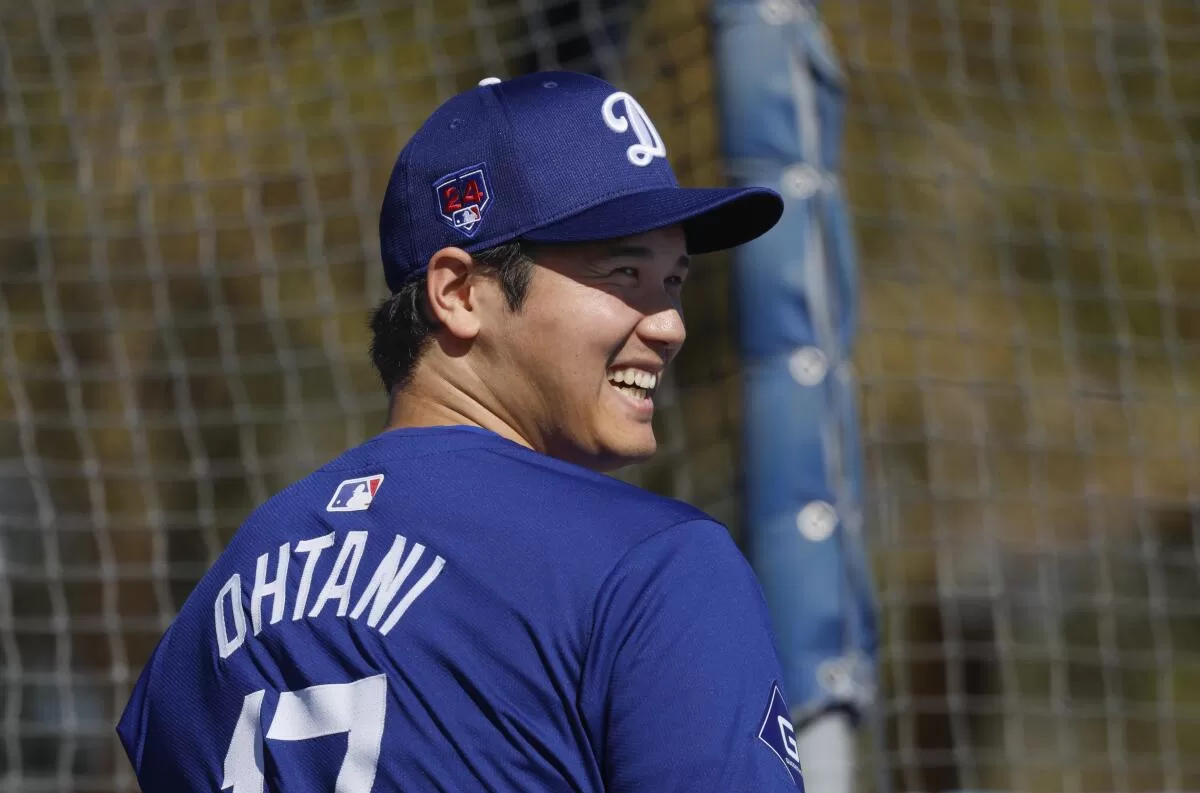Unlike some voices around the industry, however, the executive director of the Major League Baseball Players Assn. didn’t question whether MLB’s contract deferral rules needed to be changed as a result.
“We want the players and their individual representation to have as many tools in the tool bag to work with teams to find common ground,” Clark said in an interview with The Times. “All of those things we should assume to be correct.”
Clark’s comments came Monday, minutes after he and other MLBPA officials met with Dodgers players at the team’s Camelback Ranch facility; and more than two months after Ohtani inked a record-setting deal that stunned many agents, executives and evaluators around MLB.
“I don’t think I’m speaking out of turn,” Clark said, “to suggest that Shohei was a fairly unique player with unique opportunities.”
Ohtani, of course, hasn’t been the only star player to sign a deferral-laden deal in recent years. The Dodgers alone have several players on similar deals, including Mookie Betts ($115 million of $365 million deferred), Freddie Freeman ($57 million of $162 million deferred) and even Tesocar Hernández ($8.5 million of $23.5 million deferred).
The trend hasn’t gone unnoticed by some agents around the industry, especially for deals such as Ohtani’s in which the “net present value” of a contract — essentially, how much a deal with deferrals would be worth if it were paid out in the present day, since money in the future isn’t as valuable because of inflation — is significantly lower than the actual guaranteed total.
Although Ohtani’s total guarantee was a record-breaking $700 million, the MLBPA calculated its net present value to be only $437.5 million.
But, under MLB’s collective bargaining agreement, there are no restrictions on how much money teams and players can agree to defer in contracts.
And, according to Clark, that’s a “right” the union is determined to protect.
“For us, the fundamental simply is making sure that the player, the individual representative and the teams that may be otherwise engaged have as many options at their disposal [as possible],” Clark said.
“It’s the rights that the players have, that they can choose to use in the fashion that they deem fit,” he added. “We offer them perspective. We offer them history. We offer them any information to help them make the best decision they can themselves. So if a player decides to do what Shohei did, they can make that determination. If another player comes in and he wants and finds a team that’s willing to have their contract all in present value, that’s fine as well.”
(Robert Gauthier / Los Angeles Times)
A more consequential recent development to Clark — and agents around baseball — was MLB commissioner Rob Manfred saying last week that the league would prefer to institute a “free agency signing period” in the offseason, preferably in December around the time of the league’s winter meetings.
It’s not a new issue. In October 2019, the league proposed to the MLBPA a free-agency deadline for players to sign multiyear contracts, only to have the concept quickly shot down by the players’ union.
“This goes back to our conversation about having as many tools in the toolbag as you can,” Clark said. “The truth is, having the opportunity to have [free-agent] conversations without the deadline — and for the teams and the players and their individual representatives to have that flexibility not against the backdrop of an artificial deadline — made a whole lot more sense than the damage we thought it could do based on the proposal that was sent across to us.”
Alas, the idea has resurfaced throughout this past offseason.
Ohtani’s longer-than-expected free-agent process sparked a wave of speculation about how MLB could add timely interest to its hot stove season.
So too has a seemingly slow free-agent market in the months since, with several top stars — including two-time Cy Young Award winner Blake Snell and former National League MVP Cody Bellinger — remaining unsigned into the first week of spring training.
Yet, any hard deadline would almost certainly be opposed by the union, out of concern about how it might pressure free-agent players.
“We’ve had two player meetings as of this spring,” Clark said, “and being able to remind them of what the actual proposal was [in 2019], they all understand. They all understand that it’s not to their benefit.”
“We’ll see if the league decides to make another proposal along those lines, and we’ll engage the players and the agent community when they do,” Clark added. “Then we’ll go from there.”
